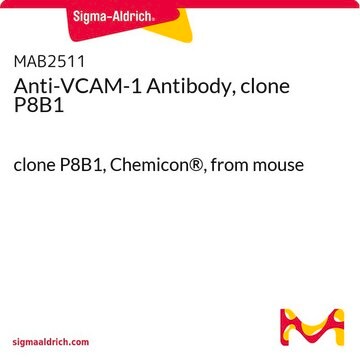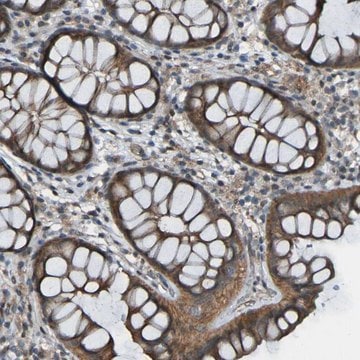ZRB2134
Anti-p-PTEN (Tyr240) Antibody, clone 3G6 ZooMAb® Rabbit Monoclonal

recombinant, expressed in HEK 293 cells
About This Item
Recommended Products
biological source
rabbit
Quality Level
recombinant
expressed in HEK 293 cells
conjugate
unconjugated
antibody form
purified antibody
antibody product type
primary antibodies
clone
3G6, recombinant monoclonal
description
3G6 Clone
product line
ZooMAb® learn more
form
lyophilized
mol wt
calculated mol wt 47.17 kDa
observed mol wt ~52 kDa
species reactivity
human
species reactivity (predicted by homology)
bovine, monkey, rat, mouse
packaging
antibody small pack of 25 μL
greener alternative product characteristics
Waste Prevention
Designing Safer Chemicals
Design for Energy Efficiency
Learn more about the Principles of Green Chemistry.
enhanced validation
recombinant expression
Learn more about Antibody Enhanced Validation
sustainability
Greener Alternative Product
technique(s)
affinity binding assay: suitable
immunohistochemistry (formalin-fixed, paraffin-embedded sections): suitable
western blot: suitable
isotype
IgG
epitope sequence
C-terminal half
Protein ID accession no.
UniProt accession no.
greener alternative category
shipped in
ambient
storage temp.
2-8°C
target post-translational modification
phosphorylation (pTyr240)
General description
Each ZooMAb® antibody is manufactured using our proprietary recombinant expression system, purified to homogeneity, and precisely dispensed to produce robust and highly reproducible lot-to-lot consistency. Only top-performing clones are released for use by researchers. Each antibody is validated for high specificity and affinity across multiple applications, including its most commonly used application. ZooMAb® antibodies are reliably available and ready to ship when you need them.
Learn more about ZooMAb here.
Specificity
Immunogen
Application
Evaluated by Immunohistochemistry (Paraffin) in human astrocytoma tissue sections.
Immunohistochemistry (Paraffin) Analysis: A 1:100 dilution of this antibody detected PTEN phosphorylated on tyrosine 240 in human astrocytoma tissue sections.
Tested applications
Immunohistochemistry (Paraffin) Analysis: A 1:100 dilution from a representative lot detected PTEN phosphorylated on tyrosine 240 in normal human brain tissue sections.
Immunohistochemistry Applications: A representative lot detected PTEN phosphorylated on tyrosine 240 in Immunohistochemistry applications (Ma, J., et. al. (2019). Cancer Cell. 35(3):504-518).
Affinity Binding Assay: A representative lot of this antibody bound phopho-PTEN (Tyr240) peptide with a KD of 1.0 x 10-12 in an affinity binding assay.
Western Blotting Analysis: A 1:10,000 dilution from a representative lot detected wild-type PTEN, but not the mutant PTEN.
Western Blotting Analysis: A representative lot detected PTEN phosphorylated on tyrosine 240 in Western Blotting applications (Ma, J., et. al. (2019). Cancer Cell. 35(3):504-518).
Note: Actual optimal working dilutions must be determined by end user as specimens, and experimental conditions may vary with the end user
Target description
Physical form
Reconstitution
Storage and Stability
Legal Information
Disclaimer
Not finding the right product?
Try our Product Selector Tool.
Storage Class
11 - Combustible Solids
wgk_germany
WGK 1
flash_point_f
Not applicable
flash_point_c
Not applicable
Certificates of Analysis (COA)
Search for Certificates of Analysis (COA) by entering the products Lot/Batch Number. Lot and Batch Numbers can be found on a product’s label following the words ‘Lot’ or ‘Batch’.
Already Own This Product?
Find documentation for the products that you have recently purchased in the Document Library.
Articles
Learn about the hallmarks of cancer and find reliable ZooMAb® recombinant antibodies to study them, conveniently organized by cancer hallmark.
Our team of scientists has experience in all areas of research including Life Science, Material Science, Chemical Synthesis, Chromatography, Analytical and many others.
Contact Technical Service




